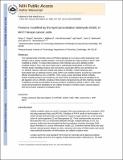Proteins Modified by the Lipid Peroxidation Aldehyde 9,12-Dioxo-10(E)-dodecenoic Acid in MCF7 Breast Cancer Cells
Author(s)
Slade, Peter G.; Williams, Michelle V.; Brahmbhatt, Viral; Wishnok, John S.; Wishnok, John S.; Dash, Ajit; Tannenbaum, Steven Robert; ... Show more Show less
DownloadTannenbaum-2010-Proteins modified by the lipid.pdf (3.162Mb)
OPEN_ACCESS_POLICY
Open Access Policy
Creative Commons Attribution-Noncommercial-Share Alike
Terms of use
Metadata
Show full item recordAbstract
The hydroperoxide of linoleic acid (13-HPODE) degrades to 9,12-dioxo-10(E)-dodecenoic acid (DODE), which readily modifies proteins. This study identified the major proteins in MCF7 cells modified by DODE. To reduce false positives, three methods were used to identify DODE-modified proteins. First, cells were treated with a synthetically biotinylated 13-HPODE (13-HPODE-biotin). Modified proteins were enriched by neutravidin affinity and identified by two-dimensional liquid chromatography−tandem mass spectrometry (2D LC-MS/MS). Second, cells were treated with native 13-HPODE. Protein carbonyls were biotinylated with an aldehyde reactive probe, and modified proteins were enriched by neutravidin affinity and identified by 2D LC-MS/MS. Third, using a newly developed DODE antibody, DODE-modified proteins were located by 2D sodium dodecyl sulfate−polyacrylamide gel electrophoresis and Western blot and identified by in-gel digestion and LC-MS/MS. Analysis of the proteins characterized by all three methods revealed a significant overlap and identified 32 primary proteins modified by DODE in MCF7 cells. These results demonstrated the feasibility for the cellular formation of DODE protein−carbonyl adducts that may be future indicators of oxidative stress.
Date issued
2010-02Department
Massachusetts Institute of Technology. Department of Biological Engineering; Massachusetts Institute of Technology. Department of ChemistryJournal
Chemical Research in Toxicology
Publisher
American Chemical Society
Citation
Slade, Peter G. et al. “Proteins Modified by the Lipid Peroxidation Aldehyde 9,12-Dioxo-10(E)-dodecenoic Acid in MCF7 Breast Cancer Cells.” Chemical Research in Toxicology 23 (2010): 557-567. Web. 2 Nov. 2011.
Version: Author's final manuscript
ISSN
0893-228X
1520-5010